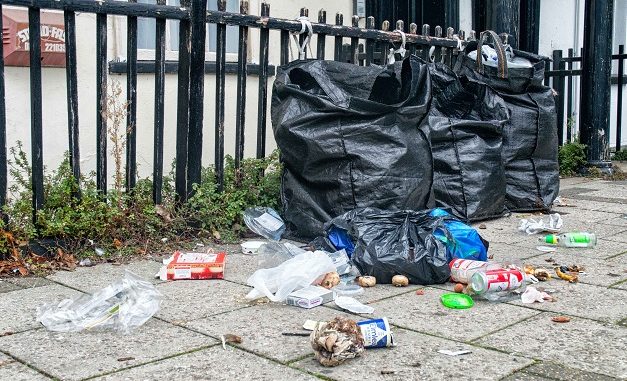
Tricia Austin of Ramsgate Litter Forum & Thanet Green Party takes a look at recycling and how Thanet could do better.

Today (March 18) is Global Recycling Day, co-ordinated by the Global Recycling Foundation, who point out: “The waste stream continues to grow at a frightening rate which we cannot just ignore – or worse, pass on to future generations to handle.”
We don’t do very well on recycling in Thanet. In a national table of Local Authorities, we’re well into the bottom half – though in fairness many do far worse. A ‘perfect storm’ of factors make recycling a real challenge on the Isle, including:
- many blocks of flats and HMOs with extremely limited storage for waste & recycling
- some landlords who don’t provide either facilities or information
- a high turnover of tenants in some areas, and lots of AirBNBs with short-stay visitors
- high coastal winds that knock over recycling bins and spread the contents of boxes
- almost no public recycling facilities, many withdrawn as a result of ‘misuse’
- a Local Authority structure where Thanet council bears the brunt (in dealing with fly-tipped waste) of KCC’s decision to start charging for large loads at household waste sites.
The recent, apparently temporary, closure of public recycling facilities in Sainsburys’ at Westwood Cross (*facilities are expected to reopen in April according to the supermarket chain) has led to an outcry on local social media groups, highlighting just how many people with no household recycling collections were in the regular habit of taking a trip over to Westwood in private cars to drop their recyclables into the public bins. As an area that’s declared a Climate Emergency, surely we must reflect on how sustainable this arrangement is?
Are we a hopeless case, or can something be done? As Chair of Ramsgate Litter & Recycling Forum and a Green Party member, I have to believe we can improve! But it will take political will, at all levels of local government.
I know TDC’s Cabinet Member for Operational Services is reviewing waste services at present, so I have 5 recommendations for him to consider on Global Recycling Day:
Build a much closer relationship with KCC on household waste & recycling. Specifically:
- help KCC establish reuse facilities at its waste sites, so useable items can go to local charities and good causes rather than being recycled or incinerated. Many other authorities do this; it doesn’t take a lot of space or staff time, and it can start to change people’s thinking about sustainability and product lifecycles.
- get involved in local reuse initiatives too – Margate has a ‘Library of Things’ for swapping unwanted items, for example, and there are local Freecycle & Freegle groups which would welcome Local Authority help & support.
- agree on ways to disincentivise fly tipping. There’s a wide choice of strategies, from removing KCC charges through better information to CCTV and increased fines – but there are more proactive ones too. One local housing association runs ‘skip days’, for example, when householders can get rid of unwanted large items – but alongside this there’s a swapshop for things like children’s outgrown clothes, and experts on hand to help with furniture upcycling.
Conduct a complete review of recycling facilities in Thanet.
- Look at which properties have no kerbside recycling and why, and think creatively about shared facilities, smaller collection vehicles, lidded boxes so the contents don’t blow down the street (yes, slower to empty, but think of the saving on street cleansing!) Look at where local public recycling bins could be sited, in places that are secure and can be monitored, using attractive modern bins that make recycling more appealing and misuse more difficult. Think ‘why would we NOT make recycling available?’ rather than ‘why do it?’ Establish a clear strategy for increasing recycling rates, with challenging but achievable targets.
Thoroughly investigate ‘reverse vending’ machines
- Consider providing them across the Isle, either working with retailers like Iceland that have trialled this in other areas, or perhaps as a joint authorities’ initiative with KCC. Something that incentivises people, particularly youngsters, to pick up cans & bottles and recycle them has got to be a win-win (though in time of pandemic it’d clearly need some extra safety checks.)
Never, ever again approve planning permission for any new build or conversion that does not have ample facilities for waste and recycling.
- Ensure that staff tasked with working with ‘rogue landlords’ help those landlords advise tenants how to manage their waste, as it’s often these same tenants who are filling our street bins with domestic rubbish and recyclables simply because they don’t know what else to do with them.
Finally (and I’d say this to every portfolio holder in every Council in the land about every area of Local Authority activity), talk with your communities and listen to what they have to say about what works and what doesn’t in their local area. What works in Cliftonville might be disastrous in Ramsgate or vice versa, and Authorities don’t need a ‘one size fits all’ approach. Residents are entitled to parity of service, but that does not necessarily mean exactly the same service in all circumstances. Local ward councillors should be the eyes & ears of the Council here, acting as a conduit of information in both directions between council and communities to agree what works best locally.
Last but not least, I’d like to give a big shout out on Global Recycling Day to every individual who does their best to recycle their waste, and every Local Authority officer who works hard to help them do so. We can improve things if we carry on working together.

